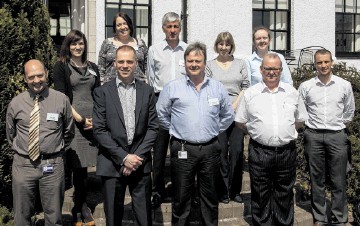
In the event of an offshore gas leak or similar disaster, where internal emergency procedures are launched, easy access to up-to-date critical technical information is of paramount importance.
This is why information management (IM) is becoming a topic in the energy industry.
Oil, gas and engineering companies in particular tend to have large volumes of business-critical technical information that must be well managed to avoid exposure to risk and inefficiencies.
Organisations that have built a convincing business case for investment in IM, viewing it as a critical asset and not one that merely supports the business and other functions, will ultimately benefit from considerable efficiency gains and cost savings.
To effectively manage information, it is essential to have skilled personnel.
Finding individuals with suitable training and skills in this area can prove difficult, as a career in information management or document control may not be recognised as a potential option for students.
“People tend to fall into the role – there is no well-defined career path,” said Fionnuala Cousins, information management business analyst at Aberdeen-based IT managed-services specialist Amor Energy, part of Amor Group.
“There is huge employment and development opportunity within this function as any form of information in an organisation needs to be managed, just the same way as other assets such as capital, labour and resources need to be managed.”
Amor Energy, in partnership with Robert Gordon University (RGU), aims to address the skills gap through RGU’s first document-control course, developed in consultation with industry.
The short foundation course, which welcomed its first students in May, has been developed for new entrants to the document-control function in the oil and gas sector.
The course was born out of the UK’s only IM Energy Forum, which was created as part of a knowledge-transfer partnership (KTP) between the two organisations and brings together oil and gas professionals in the north-east.
It enables students to gain understanding of the value and practice of information management and document control.
RGU has developed its unique course with industry guidance obtained from the IM Energy Forum, as well as a course-content steering group, created in 2011, which comprises experts from Wood Group PSN and Total E&P UK.
The course is delivered through distance learning, where students study interactive web-based learning material with tutor support and complete online assessment tests using the university’s online learning environment, CampusMoodle.
“Having an entry-level course is very important for document control as it helps create a natural career entry point, particularly in the oil, gas and engineering sectors,” said Ms Cousins, who helped create and develop the course.
“Information management is also something that applies to all businesses and the course will provide students with highly sought-after skills.”
Ms Cousins first joined Amor Energy as part of the KTP with RGU to develop the IM Energy Forum and has since become a permanent member of staff and is also an associate lecturer at RGU.
She said: “IM can be difficult to make comprehensible. There’s a phrase some use: ‘Information management is making the right information available to the right people at the right time’. Unfortunately, it’s not explicit about the business impact.
“In my view, IM has two ultimate goals. These are legal and regulatory compliance, and conferring competitive advantage.
“The former is much more meaningful for directors, users and colleagues because it is expressed in terms that immediately bring to mind opportunities, fines, prosecution, revenue, share prices and MPs assuring an angry public that lessons will be learned.
“It speaks to central organisational objectives. People will accept the legal side easily, but there is still a challenge ahead when it comes to explaining the competitive-advantage side.”
Laura Muir, senior lecturer in the department of information management at RGU, said: “RGU’s document-control course is an ideal professional-development opportunity for people who work within this function.
“When the course was launched, we had a very healthy response and the demand for places shows that students and oil and gas firms recognise the important role information management and document control plays in the industry.
“The wide range of skills required in the IM career path could not be covered in one course, so we will continue to work with industry to develop follow-on courses for more experienced document controllers and information analysts.”
The course is currently running for the first time and will run again in January 2013 and, from then on, three times a year.
For more on information management for the oil and gas industry, visit: www.amorgroup. com/im For more information about the course, visit: www.rgu.ac.uk/documentcontrol
Pictured: Back row: Carolyn Shelley, energy marketing manager, Amor Group; Angela Walker, management system lead, Taqa; Doug Duncan, service delivery manager, Total; Helen Shiach, business information analyst, Taqa; Fionnuala Cousins, IM business analyst, Amor Group and Associate Lecturer, RGU. Front Row: Neil Jones, senior document controller, Cairn Energy; David Whitson, electronic document and records management services manager, Total; Martin Wadsworth, information co-ordinator, Premier Oil; David Sneddon, IM manager, Centrica Energy Upstream; Chris Forbes, sharepoint consultant, Premier Oil